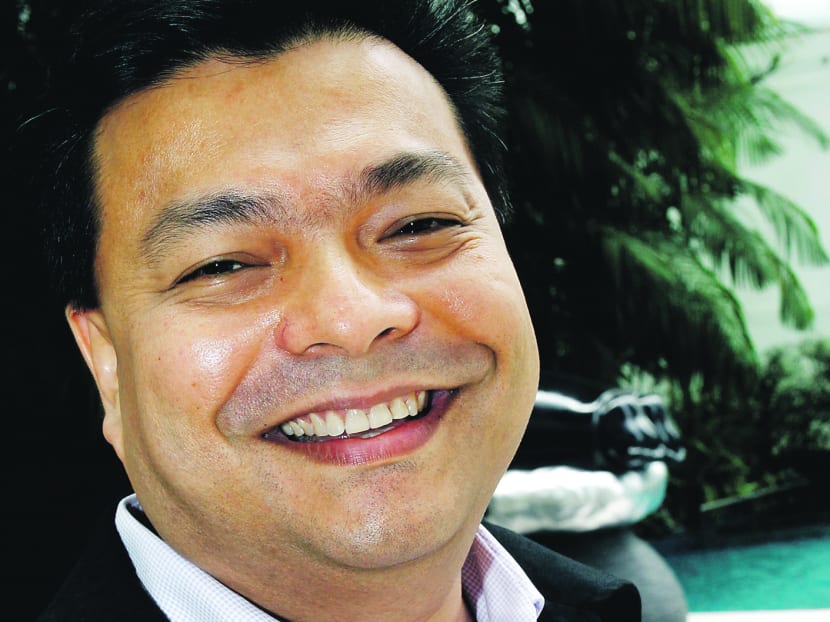Cisco MD who took 6 years to pass O-Levels: Failure’s just success delayed
Whenever he shares his success story at school talks or public events, Mr Joshua Soh never fails to mention that it took him six years to get through secondary school instead of the usual four.



Whenever he shares his success story at school talks or public events, Mr Joshua Soh never fails to mention that it took him six years to get through secondary school instead of the usual four.
Streamed into a Normal (Academic) class, he repeated a year after scoring badly the first time he sat for his O-Levels.
“I wear it as a badge of honour rather than treat it as something I’m ashamed of, because that experience was instrumental: It helped me become more resilient in the face of challenges. That’s why I believe that failure is a postponed success,” says the man who is today the Managing Director and “Chief Mentor” for technology giant Cisco’s regional headquarters in Singapore, in charge of 1,000 employees.
Over lunch at The St Regis Singapore, he shares about a speech he gave to a graduating class at Republic Polytechnic some months back.
“I told them, no matter what anyone has said, recognise that you’ve made it ... There’s nothing that you cannot achieve, the limitations are in your mind; don’t let that mental block hold you back.”
The 44-year-old is effusive as he speaks about his unconventional upbringing, and the people who made sure he “never really went too far from the straight and narrow”.
A RASCALLY REBEL
The youngest of four sons, he was seven when his parents “hit splitsville” and his mother went to work overseas, leaving the children with their father.
“My older brothers were kind of on their own by then, the sort who were taking the bus everywhere by themselves.”
His godparents became the “constants” in his life when they took him in and raised him.
“They shaped my life and my values growing up. I’m very much closer to my godparents’ family till this day,” he says matter-of-factly.
When he passed his Primary School Leaving Examinations and entered the Normal stream at St Joseph’s Institution (SJI), it was considered “quite a big thing” as his three brothers had dropped out even before taking the PSLE.
In SJI, he was a self-confessed rascal who rebelled against his teachers — “it was a combination of all the challenges at home and trying to find my identity” — but was won over by their nurturing approach. “They were never really intrusive or oppressive. Instead, they’d just check in once in a while to make sure that I had someone to turn to, to talk to,” he says.
It worked. Instead of falling in with the wrong crowd, he threw his energy into co-curricular activities such as Scouts and helping out around the school.
“I came to love the school very much, so even just decorating for National Day, hanging the buntings around the compound, I enjoyed it — anything to do with school,” he enthuses, with lively gestures to emphasise his words.
THE WAKE-UP CALL
While getting through N-Levels was “easy”, the first time he sat for his O-Levels, he scraped through with 21 points and was sent to the now-defunct Woodsville Pre-U Centre, which he terms a “wake-up call”.
“It was my first time stepping into a government school, and it was shocking for me. I realised that I was very protected because in mission schools like SJI, even though we have the riff-raff … it wasn’t (like what it was in) the neighbourhood school context.”
To make things worst, their General Paper teacher “could not speak English”, as he puts it.
The moment he was let out of school, he found a public phone and called SJI. The call was picked up by then Vice-Principal Joseph Guan.
Mr Soh recalls: “I told him, ‘I don’t think this is going to work.” And he understood what I meant. He said, ‘No problem, just come back tomorrow’. And I did.”
“At that time, repeating was out of the norm. Usually, they want you out because they can’t accommodate so many students. But the brothers handled everything, including the Ministry of Education. I’ve no idea how but they did it. That’s how blessed I was.”
‘EVERYTHING IS POSSIBLE’
Lots of “humble pie” had to be eaten when he entered SJI for the sixth year, “because of my high profile”, but he is forever grateful for the opportunity. “I learnt that if you put your mind to anything, everything is possible,” he says.
For example, while he previously scored F9 in Mathematics, he caught up within three months and soon started helping his teacher with the weaker students in class.
At the end of the year, he scored 12 points for his O-Levels and was posted to Catholic Junior College, then went on to earn a place to study English Literature and English Language at the National University of Singapore.
While staying in the university’s halls, Mr Soh picked up a friend’s Management Information Systems textbook one day, and was surprised to discover that he understood and enjoyed learning about concepts to help organisations manage themselves more efficiently and effectively.
Noting his interest, his hall master recommended he work at a start-up tech company, NetCenter, which as it turned out kicked off his career in technology services.
He moved on to ECS Computers (Asia) where he distributed IBM products, and was recommended for a position at IBM Singapore. There, he stayed for 12 years, becoming Country Manager of Integrated Technology in Singapore and spending a year-and-a-half as Head of Global Technology Services in Vietnam.
SHOW THE WAY FORWARD
But the idea of giving back by identifying, nurturing and mentoring leaders in a young company pulled at him, and he joined Cisco Singapore in January last year.
“I had the good fortune of having wonderful mentors who helped me understand and develop leadership competencies. I felt I had to do likewise, so now it’s about reaching out and helping people, especially younger people — giving them a chance, a starting point and showing them the way forward.”
Fully in his element as he shares his views on nurturing leaders, the affable Mr Soh is compelling to listen to — even as he routinely pauses to urge his table-mates to eat, jokingly threatening to stop the interview if we did not.
Noting how quickly the technology services industry evolves, he points out that companies now require leaders, not managers.
“We need leaders who will show the way forward. The thing about managing is it has the connotation of keeping the status quo. But we can’t because the market shifts and technology transitions are occurring at a faster rate.”
Cisco, notably, assigns employees project leadership roles — without any formal authority or title — for them “to rally their own peers towards a certain outcome”.
Speaking at a mile a minute, he explains: “If they are a leader even to their own peers, when we promote them, the whole group celebrates because we are promoting someone who in their eyes is already a leader.”
NO SUPERSTARS OR BARRIERS
Asked what he looks for in his leaders, he briskly quips: “3As — Aptitude, Attitude and Acumen.”
He also firmly believes that there should be no “superstars” in any team, even as he leads Cisco Singapore — which turns 20 this year — in its mission to “connect the unconnected”.
“You don’t want any prima donnas, you want team players who are genuinely driving for success and willing to bring others along for the ride, including the support staff.”
That is why he can be found sitting among employees at CISCO’s office in Changi Business Park.
“No matter how high (in position) you are, nobody has an office. It’s free seating. We have different work areas, desks, workspaces, privacy rooms, nap rooms … so you choose the workplace you need. Having our executives sit with the rest of their team makes them accessible and creates an open engagement with the teams, as there are no physical barriers between management and the staff.”
But more than just being a leader, Mr Soh also firmly believes in what he calls “reverse mentoring”, or learning from the younger generation.
Pointing out how his 17-year-old god-daughter had been the one to set up a Twitter account for him, he said: “They are the digital natives mentoring us into the digital age. We created the platforms, but they were born into it.
“I enjoy spending time with them not just because they make me feel young, but they also teach me a lot because they see things from a different perspective. Just hearing them out, I feel richer for it.”
That is also why, despite having his days jam-packed with meetings, the bachelor spends his evenings catching up over a meal with his mentors or mentees.
“Mentoring isn’t about being a know-it-all — it is about mutual learning. In a trusted, open environment, we can share ideas and grow.”








